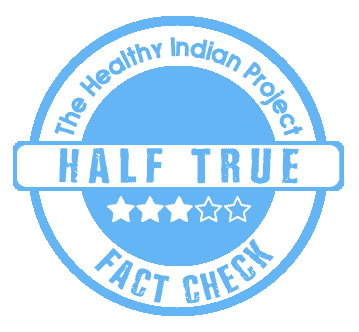Last Updated on August 17, 2023 by Neelam Singh
Quick Take
A social media post claims that vitamin C reduces the risk of developing cataracts and macular degeneration. We fact-checked and found the claim to be Half True.

The Claim
A Facebook post claims that vitamin C can lower the risk of developing cataracts and slow the progression of age-related macular degeneration when taken in combination with other essential nutrients.
We have attached the screenshot of the post below:

Fact Check
What is vitamin C?
Vitamin C, or ascorbic acid, is a water-soluble vitamin with antioxidant properties. Several factors contribute to the development of cataract, including age, genetics, smoking, excessive sunlight exposure, and certain medical conditions. It must be obtained through diet or supplements since the body cannot produce it naturally.
What is a cataract?
A cataract is when the eye’s natural lens becomes cloudy over time, causing blurred vision, sensitivity to glare, and other visual problems. It can be due to aging, UV exposure, or medical conditions. Cataract surgery replaces the cloudy lens with an artificial one, improving vision.
What is macular degeneration?
Age-Related Macular degeneration (AMD) is a progressive eye disease affecting central vision due to damage to the macula. It is the leading cause of blindness in people over the age of 60.
This condition comes in dry and wet forms, with symptoms like blurred vision. While there’s no cure, treatments can help manage it. Regular eye exams are vital for early detection.
Can vitamin C reduce the risk of developing cataracts and macular degeneration?
Partially correct. There is some evidence to suggest that vitamin C may play a role in eye health and potentially lower the risk of developing certain eye conditions, such as cataracts and age-related macular degeneration (AMD). However, it’s important to note that while vitamin C is beneficial for overall health, its specific impact on eye health may vary and is not a guaranteed preventive measure. Even the available scientific evidence on this specific relationship is not conclusive.
Some research papers have suggested a potential association between higher vitamin C intake and a reduced risk of cataracts and macular degeneration. However, other studies have not found.
Evidence only shows that vitamin C is an antioxidant, which means it helps protect cells from damage caused by free radicals. Free radicals are unstable molecules that can damage cells, including cells in the retina. The retina is the light-sensitive tissue at the back of the eye that converts light into electrical signals that are sent to the brain. So, research only suggests that vitamin C intake may help reduce the risk of developing cataracts and macular degeneration. However, the evidence is not definitive, and more research is needed to establish a clear causal relationship.
Can diet reduce the risk of cataracts and macular degeneration?
To a certain extent. Maintaining a healthy diet can indeed lower the risk of cataracts and macular degeneration, common age-related eye conditions. Both cataracts and macular degeneration can be influenced by antioxidants found in food items. Also, nutrients such as Lutein and zeaxanthin also contribute to lens protection. Omega-3 fatty acids can also be beneficial. Moreover, essential minerals like zinc and copper can aid in maintaining retinal health.

Dr Aditya Sethi, Cataract, Refractive, Pediatric Ophthalmic and Strabismus Surgeon at Gurgaon, informs, “Diet alone cannot reduce the risk of developing cataracts and macular degeneration. However, diet can play a contributing role in reducing the risk of cataracts and macular degeneration. Antioxidant-rich foods, like fruits and vegetables, can help. Vitamins and minerals, such as vitamin C, vitamin E, zinc, and beta-carotene, are associated with eye health. Vitamin C, in particular, has antioxidant properties that may contribute to maintaining healthy eyes. However, a balanced diet and regular eye check-ups are essential for overall eye care.”
However, while a balanced diet helps reduce risks, genetic and environmental factors also contribute to these conditions. Regular eye check-ups and consulting specialists remain crucial for comprehensive eye care.
The National Eye Institute (NEI) website informs that after people turn 40, the proteins in your eye lens naturally start to break down, causing cataracts. Doctors and researchers are still figuring out why cataracts happen, but they know some things that can make them more likely, such as having family members with cataracts, diabetes, serious eye injuries, eye surgeries, taking steroids for health issues, and getting radiation treatment. They also found that cataracts can develop faster if you smoke, drink too much alcohol, or spend a lot of time in the sun without wearing sunglasses.
Likewise, NEI website informs that macular degeneration is mainly linked to aging and damage to the macula. Family history, genetics, smoking, nutrition, ethnicity can all contribute to the risk of developing this condition. While the exact causes are not fully understood, a healthy lifestyle, including proper diet, not smoking, protecting eyes from sunlight, and managing health conditions, can help lower the risk. Regular eye check-ups are crucial for early detection and management.
It’s worth noting that a balanced diet that includes a variety of nutrients, including vitamins and minerals, is important for overall well-being and may contribute to maintaining good eye health. However, the impact of individual nutrients like vitamin C on specific eye conditions is still an area of ongoing research. Also, It is important to note that available research cannot establish whether vitamin C can cure cataracts and macular degeneration. Hence we need more rigorous research to determine whether vitamin C can truly reduce the risk of cataracts.
While consuming foods rich in vitamin C, such as oranges and other citrus fruits, is generally beneficial for eye health, it’s best to maintain a balanced diet that includes a variety of nutrients. Additionally, it’s important to consult with a healthcare professional for personalized advice regarding your eye health and nutritional needs.
Disclaimer: Medical Science is an ever evolving field. We strive to keep this page updated. In case you notice any discrepancy in the content, please inform us at [email protected]. You can futher read our Correction Policy here. Never disregard professional medical advice or delay seeking medical treatment because of something you have read on or accessed through this website or it's social media channels. Read our Full Disclaimer Here for further information.

